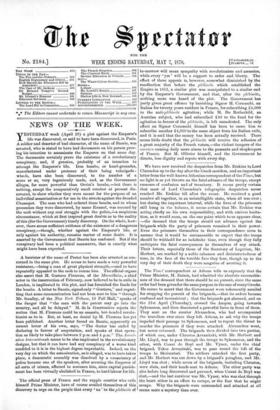We have now received the despatches from Mr. Erskine toLord
Clarendon up to the day after the Greek murders, and an important letter from the well-known Athenian correspondent of the Times, but no light is as yet thrown on the fatal advance of the troops, except rumours of confusion and of treachery. It seems pretty certain that most of Lord Clarendon's telegraphic despatches never reached Mr. Erskine till after the event. He received a good number all together, in an unintelligible state, when all was over ; but during the important interval, while the lives of the prisoners still hung in the balance, it seems certain that Mr. Erskine was acting chiefly on his own responsibility, and with curious hesita- tion, as it would seem, on the one point which to us appears clear, —the demand that the troops should not advance against the brigands while the party of prisoners remained in their power. Even the prisoners themselves in their correspondence seem to assume that it would be unreasonable to expect that the troops should be withheld for an indefinite time, even though they fully anticipate the fatal consequences to themselves of any attack. Their letters, especially those of the Secretary of Legation, Mr. Herbert, are marked by a noble calmness and disinterestedness of tone, in the face of the terrible fate they fear, though up to the very day of their death they were sanguiue of averting it.






























